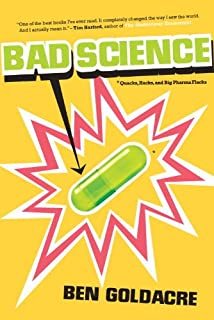Bad Science; Ben Goldacre; 2008; Farrar, Straus and Giroux; 258 pgs
 Ben Goldacre is a UK Physician. He has written two books on this general subject: the shorter Bad Science and the longer Bad Pharma. He is a good writer with a cutting sense of humor. Unlike most doctors (GPs anyway) he knows a thing or two about statistics and probabilities.
Ben Goldacre is a UK Physician. He has written two books on this general subject: the shorter Bad Science and the longer Bad Pharma. He is a good writer with a cutting sense of humor. Unlike most doctors (GPs anyway) he knows a thing or two about statistics and probabilities.Blythe N. and Dave H. know about my disdain for chiropractors. During our radio days, their disdain for nutritionists turned out to be just as strong. Ben would concur.
Goldacre fires broadsides at the usual targets such as homeopathy, as well as a few lessor known examples of bad science, like brain training, detoxing, and the anti-oxidant scare. And like many other skeptical publications, he takes a close look at placebos and regression to the mean, the life blood of quacks everywhere.
Good vs bad science is easy to recognize, even for the cognoscenti, and for every study, there is an opposing study. To deal with this, a check list protocol was set up called JADAD a meta-analysis protocol was built on JADAD called the Cochrane Collaboration. These two ideas allow the truth to eventually come out. It is likely, for example, that the recent reversal on cholesterol was based on this method.
Surprisingly for some, he poo-poos placebo based trials, as this is often a dodge. Researchers test their products (i.e.: drug) against placebo, the lowest possible standard, and not against the best product on the market at the time.
A major warning from the good doctor: If anyone expresses anything with respect to diet in terms of certainty, they are full of crap. He debunks another myth by stating that most of modern medicine is, in fact, evidence based.
Here are some fun real-world examples (think big tobacco) of cheating in the business of drug science.Confirm your own results;Only compare your product to placebo;If testing against a competitor's drug, do not follow its dosage instructions;Only report surrogate results;If your tests perform badly, ditch them, or delay their publication;Beat your data to death until you get a positive correlation;Assume correlation is causation;If your drug is performing poorly against placebo, adjust the baseline (move the goal posts);Ignore trial dropout rates;Wash your data and ditch outliers;Do tests until you get the result you want (sort of like Quebec sovereignty), then publish selectively;Do not publish your data, or only publish the washed data;Publish the same results, but written up differently, in several publications;Hide harm (e.g.: don't publish contra-indicators).
Or do what the NFL did: set up its own bad research; establish a self-published journal; and then stack it with doctors on the take (see League of Denial).
Both Bad Pharma and this book go into some detail on this topic. One solution, which is not yet been adopted, is to register experiments before they start. This forces a priori documentation of experiment protocols, success/ fail criteria, etc. and would go a long way toward eliminating some of the manipulation that goes on today.
The books closes with a discussion of the MMR (measles, mumps, rubella) fiasco. Ben has a few kind words for Jenny McCarthy et al.
This is must reading for all skeptics.
Published on September 12, 2020 10:21
No comments have been added yet.



